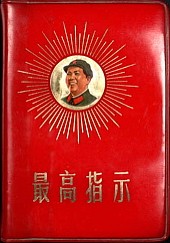Mao Zedong, the worst mass murderer of all time, lived from December 26, 1893, to September 9, 1976. He was a Communist atheist and an early member of the Chinese Communist Party in 1921. In 1935, Mao was elected to the Executive Committee of the Comintern in Moscow and remained on this committee until it was publicly disbanded in 1943.[1]
Mao was the author of Quotations from Chairman Mao, published in 1966, informally known as "the little red book." During his lifetime, almost everyone in the People's Republic of China was expected to have a copy. One of his most well known statements was that "political power grows out of the barrel of a gun".

Edgar Snow introduced Mao and Zhou Enlai to American readers in 1937 in his book, Red Star Over China, shortly after the Chinese Red Army’s rout by Chiang Kai-shek in 1934 and their year long retreat to Yenan known as the Long March. Snow wrote, "The political ideology, tactical line and theoretical leadership of the Chinese Communists have been under the close guidance, if not positive detailed direction, of the Communist International, which during the last decade has become virtually a bureau of the Russian Communist Party." And he further declared that the CCP had to subordinate itself to the "strategic requirements of Soviet Russia, under the leadership of Stalin."[2]
Mao defeated Chiang Kai-shek's Nationalists, taking control of the Chinese mainland and establishing the People's Republic of China. As the leader of China, Mao initiated the Great Leap Forward, an economic plan intended[Citation Needed] to rapidly industrialize China's then largely rural economy. In the end it proved a ruinous failure, preventing the peasants from producing needed food and causing massive famines; up to 38 million starved to death or were killed for opposing against the economic plan. In 1966, Mao instigated the Cultural Revolution, in which those disloyal to the Chairman were killed or humiliated in order to solidify Mao's control. Richard Nixon was the first United States president to meet with Mao, and thus the first to acknowledge the existence of the People's Republic of China, as opposed to Taiwan's Republic of China.
Overall, historians believe that around 43 million people died under Mao's rule, due mostly to starvation from disastrous socialist economic policies such as the Great Leap Forward. This is 7 times the common figure given for the Holocaust but it is much less known.
Name: (Traditional Chinese: 毛澤東; Simplified Chinese: 毛泽东; Hanyu Pinyin: Máo Zédōng; Wade-Giles: Mao Tse-tung)
Legacy
In their book Mao: The Unknown Story, authors Jung Chang and Jon Halliday state that in his first five years of power, 700,000 were claimed by Mao to be dead, but another 700,000 died in local excesses and 700,000 committed suicide out of fear of Mao. During the Great Leap Forward, Mao deliberately killed peasants by shipping food to the USSR and Eastern Europe in exchange for aid in building arms plants. As well, Mao's plans for peasants to make steel and build canals meant that in 1959-60 nobody grew any food. Thus, the worst famine in history occurred. Huge numbers were killed by puppets of Mao in the Cultural Revolution, which actually was launched to get rid of Mao's rivals in the Chinese Communist Party.
References
- ↑ While You Slept : Our Tragedy in Asia and Who Made It, John T. Flynn, New York : The Devin - Adair Company, 1951, pgs. 21 - 22 pdf.
- ↑ Red Star Over China by Edgar Snow, New York, 1937.
